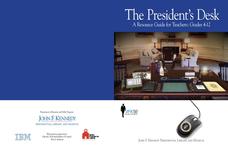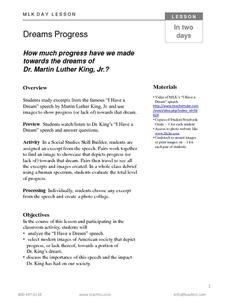Gateways
Teaching the Easter Story
If you are looking for a secular approach to teaching about Easter, this may just be the resource for you. Pupils read a paraphrased text depicting the last supper, arrest, and crucifixion of Jesus Christ as told in the Bible, while also...
Staples Foundation For Learning
The President’s Desk
What stories can a desk paperweight and picture frame possibly tell us about the president of the United States? Pupils are transported to the desk of President John F. Kennedy through an engaging interactive site. The guide offers a...
NOAA
A Moving Crust
Young scientists piece together the geological puzzle that is the earth in the third and final instructional activity of this earth science series. With the help of numerous multimedia resources and a series of engaging hands-on...
Foreign Policy Association
U.S. and Europe Online Lesson Plan
Class groups investigate the economic and political implications of a country's policies on genetically modified foods, craft a position paper detailing that policy, and share their findings with the class. Armed with this information,...
Briscoe Center for American History
Mary Maverick and Texas History - Part 2
To conclude their investigation of the life of Mary Maverick and to demonstrate their ability to analyze primary source documents, groups use the SOAPS questioning method to examine Maverick's account of events in early Texas history.
Briscoe Center for American History
Mary Maverick and Texas History - Part 1
What's the difference between a diary and a memoir? Young historians explore the ramifications of this question as they learn how to use primary source materials to gain an understanding of life on the Texas frontier.
Briscoe Center for American History
Applying the SOAPS Method of Analyzing Historical Documents
Young historians use the SOAPS (Speaker, Occasion, Audience, Purpose, Subject) method of questioning to determine the historical value of primary source documents. The third in a series of five lessons that model for learners how...
Crafting Freedom
Frances Ellen Watkins Harper: Lover of Literacy
This, the sixth in a series of 10 related resources, examines the life and works of Frances Ellen Watkins Harper, an African American author, born in 1825, who advocated literacy for both free and enslaved African Americans.
Crafting Freedom
George Moses Horton: Crafting Virtual Freedom Through Poetry
What is "virtual freedom"? How about "enslaved entrepreneurship"? Class members will learn about these terms and much more as they read the poems and examine the life of George Moses Horton.
Crafting Freedom
Harriet Jabocs and Elizabeth Keckly: The Material and Emotional Realities of Childhood in Slavery
Learning how to make accurate inferences by putting together facts found in multiple sources is one of those skills all learners must develop, but one that can be a challenge to teach. This resource is a must-have for your curriculum...
Poetry Society
War Horse and WWI Poetry
Here's a resource that deserves a place in your curriculum library. As part of their study of War Horse individuals create an anthology of World War I poetry.
TCI
Dreams Progress
Has society progressed to the dream Martin Luther King Jr. expressed in his famous address during the civil rights movement? Learners work with a partner to analyze one excerpt from King's "I Have A Dream" speech and find a current image...
PBS
Democracy in Action: Freedom Riders
This is a must-have resource for every social studies teacher covering the civil rights movement. Through an engaging video and detailed viewing guide, young historians learn about the Freedom Riders, and discover how everyday...
Curated OER
Convergence with The Cay: Exploring Geographic Concepts Wrapped in a Story
Here's an awesome unit that uses The Cay as the anchor text. The 16-page packet is loaded with teaching ideas, activities, and suggested adjustments.
Humanities Texas
Primary Source Worksheet: Lyndon B. Johnson, Excerpt from “To Fulfill These Rights”
"Equal opportunity . . . is not enough." Johnson's 1965 commencement address to the students at Howard University provides an opportunity for participants to see how education was a key element in his vision for civil rights.
Humanities Texas
Primary Source Worksheet: Lyndon B. Johnson and Martin Luther King Jr., Excerpt of Telephone Conversation
Imagine listening in on a conversation between President Lyndon B. Johnson and Dr. Martin Luther King Jr., as Johnson outlines the support he needs from King to pass the legislation required for programs essential for "The Great...
Humanities Texas
Primary Source Worksheet: Citizen Letters to President and Mrs. Roosevelt Concerning the Depression
A letter addressed to President Roosevelt and another addressed to Eleanor Roosevelt offer insight not only into these two amazing historical figures, but also into the struggles people faced during the Great Depression.
Humanities Texas
Primary Source Worksheet: Franklin D. Roosevelt, First Inaugural Address
Young historians will learn not to fear primary source materials (or fear itself, for that matter) thanks to this resource that uses Franklin D. Roosevelt's March 4, 1933 Inaugural Address to model how to conduct a close reading of such...
Humanities Texas
Primary Source Worksheet: Franklin D. Roosevelt, Excerpts from Fireside Chat on Economic Conditions
Franklin D. Roosevelt's April 14, 1938 Fireside Chat on economic conditions provides young historians an opportunity to polish their primary source comprehension skills. A great resource to add to you curriculum library.
Humanities Texas
Primary Source Worksheet: John T. McCutcheon, “A Wise Economist Asks a Question”
No joke! Kids learn how to read political cartoons using McCutcheon's drawing as a starting point and then progressing to other images found online.
Humanities Texas
Primary Source Worksheet: Theodore Roosevelt, Excerpt from “The Man in the Arena” Speech
Theodore Roosevelt's "The Man in the Arena" speech not only provides individuals with a chance to develop their reading skills but also provides much food for thought about current political situations. Cynics, fops, and voluptuaries...
Humanities Texas
Primary Source Worksheet: Theodore Roosevelt, Excerpt from “The Square Deal” Speech
Talk about a timely resource! As part of a series of primary source exercises, individuals read and respond to questions about Theodore Roosevelt's "The Square Deal" speech. Roosevelt reminds us of what our social system should be.
Humanities Texas
Primary Source Worksheet: Udo J. Keppler, “Next!”
Standard Oil's stranglehold on the US government is the subject of a 1904 political cartoon. Kids use the questions on the provided worksheet to prompt their analysis of this primary source.
Humanities Texas
Primary Source Worksheet: Grant E. Hamilton, “I Rather Like That Imported Affair”
Political cartoons are primary source documents and learning to read them can be a challenge. Challenge the reading skills of your class with a political cartoon featuring rough and ready, Teddy Roosevelt.

























